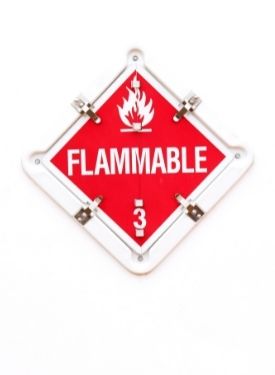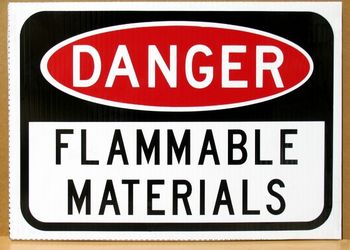As a firefighter, I’ve been asked some pretty ridiculous things. One of the topics that comes up more often than you would think is the flammability of farts. Yes, that’s right, good, old-fashioned flatulence.

Farts are flammable and can even explode when ignited. Farting or “flatulating” releases a combination of oxygen, methane, carbon dioxide, hydrogen, and nitrogen, and some of these gasses are flammable. That’s why the old party trick of lighting a fart on fire, aka pyroflatulence, is so effective (but dangerous).
Buckle up as we go on a journey into all things flatulence and flammability. By the time you’re done reading, you’ll have learned some interesting facts and you’ll be able to lead a safer lifestyle!
Table of Contents
The 411 on Flatulence – Are Farts Truly Flammable?
Although it’s not something that most people want to talk about, everybody farts. The NHS estimates that the average person will fart between five and 15 times per day. Now that you know that, there’s no need to be shy about it.
Can something as common and harmless (well, except for the smell, maybe) as flatulating be flammable? The answer is yes, but let’s explore.
What’s in a Fart?
Although flatulating is known as passing gas, it’s far from only one type of gas you’re passing when you let one rip.
Instead, the composition of an average fart is oxygen (four percent), methane (seven percent), carbon dioxide (nine percent), hydrogen (21 percent), and nitrogen (59 percent). Not every fart will contain those gasses in the exact quantities above, but for the most part, that’s what you can expect when you fart.
Fun fact, the hydrogen in flatulence includes mercaptans and hydrogen sulfide gas, but only about a percent of a fart is this type of gas. Nevertheless, the mercaptans has sulfur, and that’s why farting smells as unpleasant as it does. Well, to others. People typically don’t mind the smell of their own farts.
Are Farts Really Flammable?
Why do you need to know what’s in a fart? Well, for one, it’s fascinating (remember, we all fart, and there’s no getting around that). More importantly though, now we can talk about the flammability of farting.
As you’re aware, the average burst of flatulence contains hydrogen and methane. Hydrogen is considered one of the more flammable gasses, although that’s usually when applied to fuel cells.
The chemical compound methane is also extremely flammable. More so, if methane displaces oxygen at a rate of about 16 percent, it could asphyxiate you if you breathe in the air for long enough. This would be considered a rare event though and not something that can occur from farting.
Okay, but surely the flammability of methane and hydrogen only applies to heavy-duty industrial work, right? Certainly not your own bodily processes, you’re sure.
Nope! It doesn’t matter whether it’s a fuel cell or a fart, hydrogen is flammable. That’s also true of methane. The other gasses in a fart though are not flammable.
Can You Light a Fart on Fire?
Everyone has likely heard of the party trick that involves a rather enthusiastic partygoer dropping trough while a second person holds a match by the first person’s rear end. Then that first person farts and the flatulence can supposedly be ignited.
Is this just a myth or is it based on fact?

It’s quite factual!
Fart lighting has its own name, pyroflatulence. The act produces a blue flame that has earned pyroflatulence such nicknames as blue flame, blue dart, or blue angel. That said, sometimes the flame is a more typical yellow or orange hue than it is blue.
Flatulence doesn’t contain high enough quantities of either hydrogen or methane to burn for a prolonged period, but a fire will indeed occur for a short burst. That’s why this trick is usually done at parties, as it impresses the other partygoers.
Of course, I don’t recommend replicating this trick during your next soiree. If your friends are eager to try it, I would tell you to dissuade them as well.
Why? The possibility of injury is too high. The person who’s lighting the fart needs to stand a good distance away quite quickly after ignition or they could get burned by the emergent flames. The one who’s igniting the fart could end up burned as well.
Burns are painful no matter where on your body they occur, but in sensitive areas, the pain is going to be even more severe.
Plus, you could cause a fire by igniting a fart. If you’re standing near a flammable object when the fart ignites and that fire reaches the flammable object, the fire can spread.
There are more flammable objects in your home than you might realize. For instance, window curtains are very flammable, and furniture can be as well. The lacquer in treated wooden furniture will also produce fumes that are either carcinogenic or toxic, sometimes even both.
If you and your fellow partygoers breathe in the air for long enough, long-term health effects could result.
Is all this worth it just to win some props at a party? No. Save your dignity and avoid lighting your farts.
Can Farts Be Explosive?
No, I’m not talking here about farting profusely because you’re probably ill (or you let those leftovers sit in the fridge for too long before eating them). Rather, I want to talk about whether a fart that’s ignited can explode.
In firefighting, an explosion is defined as what occurs when gasses expand quickly and violently. The effects of an explosion are often hard to predict, but they’re usually not pretty.

So, could a fart explode? Yes, indeed, it could.
Flatulence is a fast-moving process. When you fart, the average speed is seven miles per hour, which is 3.05 meters per second. The speed of the flatulence combined with the flammability of the gasses and the ignition source does introduce the likelihood of an explosion.
Let me reiterate that explosions are unpredictable, even among us firefighters. The fire can ignite at a larger radius than usual, which is not what you want to hear when the source of the fire is near your rear.
The fire will behave erratically, so it might spread more easily as it begins burning nearby flammable objects. Your rate of injury is more severe if you’re the one participating in pyroflatulence, and the other person who ignited the fart could get seriously hurt too.
If you have a lot of people gathering around to watch, which is likely, they too could be burned or otherwise injured.
If it didn’t sink in before, I hope it does now that fiery fart tricks at a party are never worth it.
I do want to make it clear that on their own, farts will not ignite, and they won’t explode either. You don’t have to hold in a fart because you’re afraid of it starting a fire. Holding farts in too long could negatively impact your colon.
That sure was an interesting journey into the flammability of farts. You’re now aware that flatulence is indeed flammable, mostly due to the methane and hydrogen in a fart. Pyroflatulence, or that party trick where you ignite a fart, is never worth it. Farts can explode when being lit, and the consequences can be disastrous.
Stay safe out there!